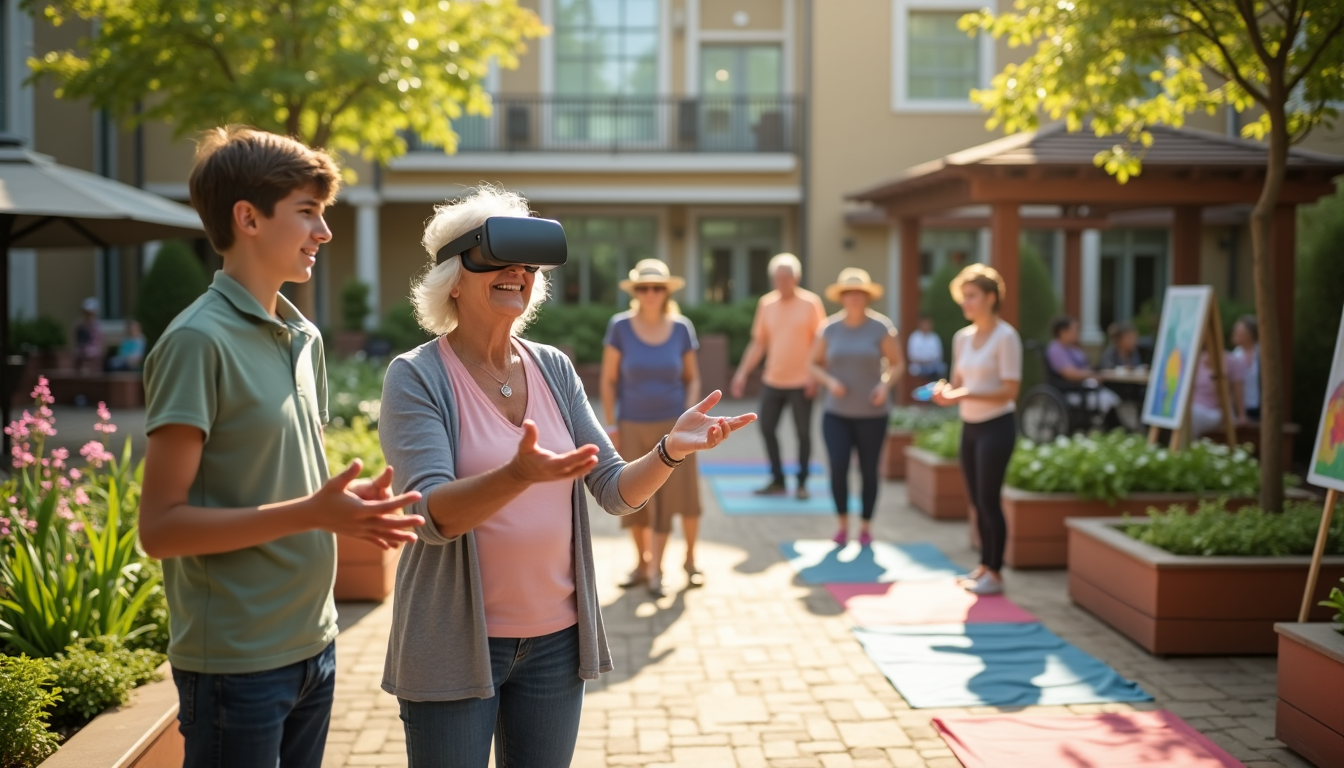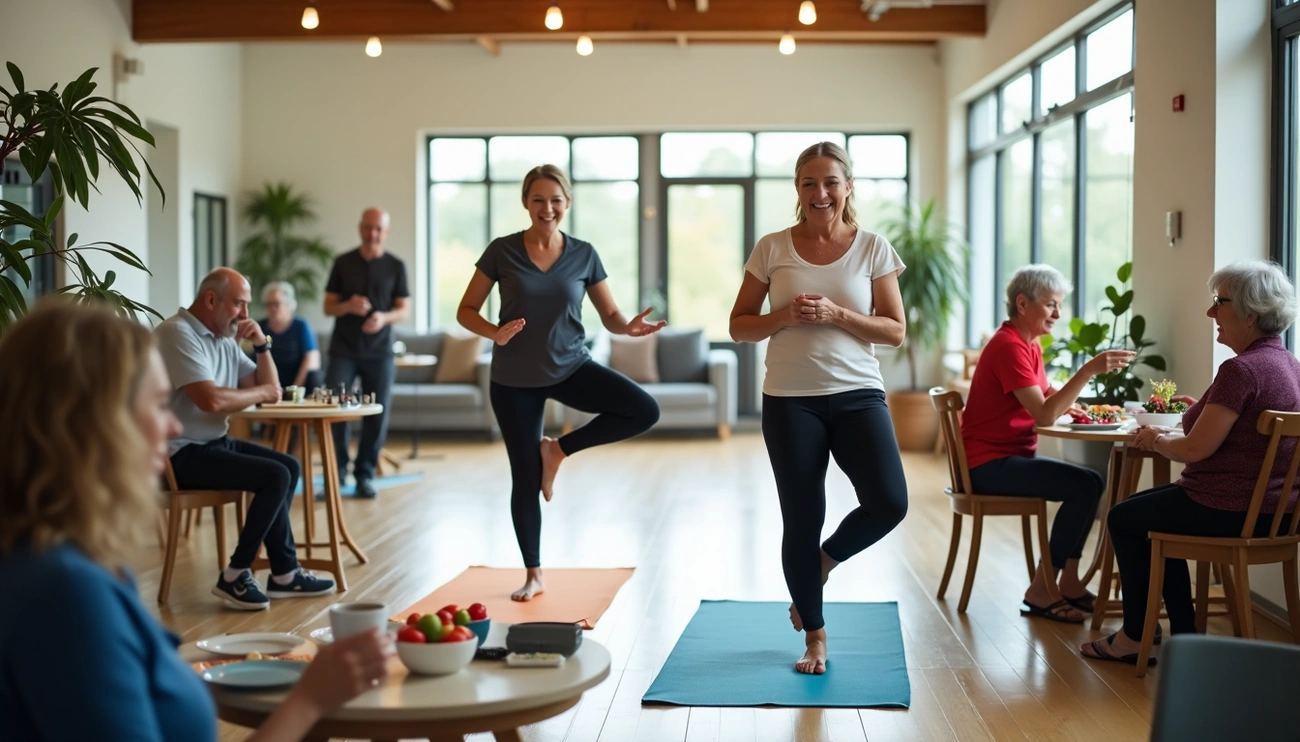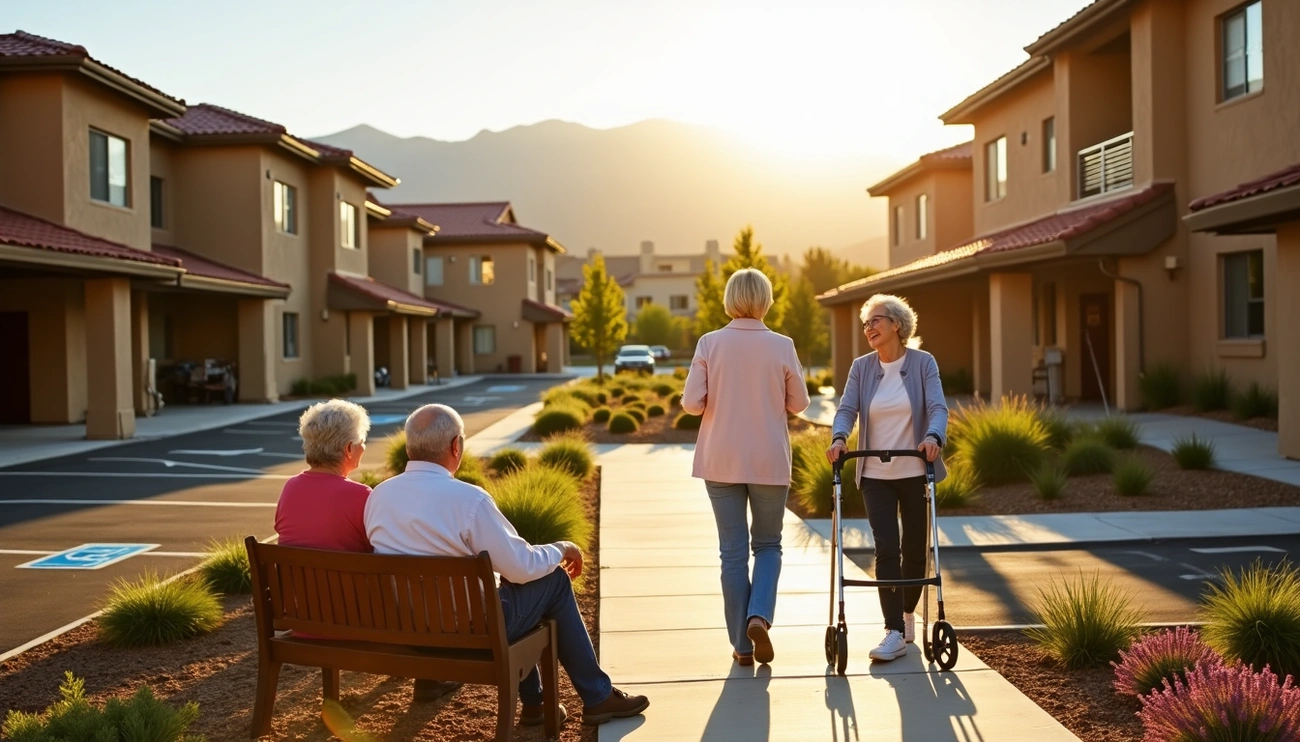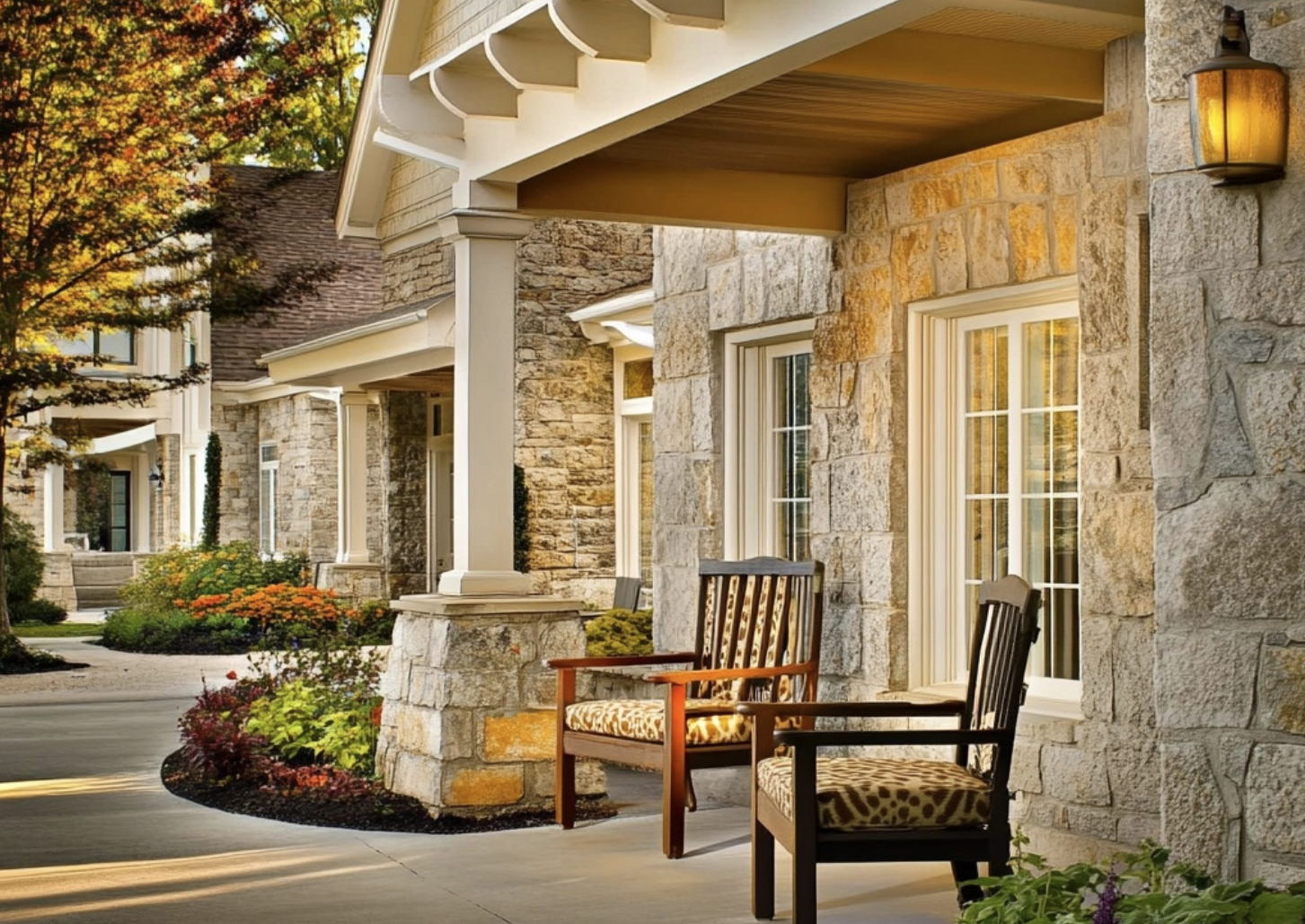Enhancing the quality of life for seniors in assisted living facilities is a critical concern for caregivers and families. As the population ages, there is a growing need for innovative activities that promote social engagement, independence, and overall well-being. These activities play a vital role in maintaining cognitive function, physical health, and emotional stability among older adults.
This article explores ten groundbreaking activities designed to improve the lives of seniors in nursing homes. From virtual reality travel experiences to intergenerational mentoring programs, these initiatives aim to foster a sense of purpose and connection. The activities covered include adaptive sports, tech workshops, mindfulness sessions, and creative arts therapy, all tailored to meet the unique needs and interests of older adults in assisted living environments.
Virtual Reality Travel Experiences
Virtual reality travel offers seniors a unique way to enhance the quality of life by exploring new destinations without leaving their homes. This innovative technology provides a safe and comfortable alternative to traditional travel, reducing physical strain and fatigue. Seniors can embark on virtual journeys that expand their horizons and create lasting memories.
Virtual Reality Travel Benefits
Virtual reality travel has a significant impact on seniors’ well-being. It stimulates cognitive function, fosters a sense of adventure, and promotes social engagement. Seniors can take virtual field trips together, sharing experiences that strengthen relationships. This technology also helps combat loneliness by allowing seniors to connect with family members, even when physically apart.
Virtual Reality Travel Implementation
To implement virtual reality travel, assisted living facilities can use VR headsets and immersive experiences. These tools transport seniors to virtual worlds that replicate real-world locations or create entirely new environments. Staff members should be trained to assist residents with the equipment and guide them through the virtual experiences.
Virtual Reality Travel Popular Destinations
Popular virtual destinations for seniors include iconic landmarks like the Eiffel Tower, natural wonders such as the Great Barrier Reef, and cultural sites around the world. Seniors can also revisit childhood homes or favorite vacation spots, evoking cherished memories and providing a sense of nostalgia.
Intergenerational Mentoring Programs
Intergenerational mentoring programs bring together seniors and younger individuals, fostering meaningful connections that enhance the quality of life for both groups. These initiatives allow older adults to share their wisdom and experiences while gaining fresh perspectives from younger generations. Such programs combat social isolation, promote cognitive stimulation, and provide a sense of purpose for seniors in assisted living facilities.
Intergenerational Mentoring Benefits
These programs offer numerous advantages, including improved social engagement, enhanced cognitive function, and increased emotional well-being. Seniors feel valued and appreciated when sharing their life experiences, which boosts their self-esteem and confidence. Younger participants gain valuable insights and develop empathy towards older adults, bridging the generation gap.
Intergenerational Mentoring Implementation
To implement successful intergenerational mentoring programs, assisted living facilities can collaborate with local schools, community centers, and youth organizations. Activities can include storytelling sessions, skill-sharing workshops, and joint volunteer projects. It’s essential to create a supportive environment that encourages open communication and mutual respect between generations.
Intergenerational Mentoring Success Stories
Many assisted living communities have witnessed positive outcomes from intergenerational mentoring programs. Residents report feeling more connected to their community and experiencing a renewed sense of purpose. Younger participants often develop a deeper understanding and appreciation for older adults, leading to long-lasting friendships and valuable life lessons.
Adaptive Sports and Fitness Classes
Adaptive sports and fitness classes offer seniors in assisted living facilities a chance to stay active and engaged, enhancing their quality of life. These activities are tailored to accommodate various physical abilities, promoting independence and social engagement. From seated yoga to wheelchair basketball, adaptive sports provide numerous benefits for older adults.
Adaptive Sports Benefits
Participating in adaptive sports has a positive impact on seniors’ physical and mental well-being. It improves mobility, flexibility, and cardiovascular health while reducing stress and anxiety. These activities also foster social connections, combating loneliness and isolation often experienced in nursing homes.
Adaptive Sports Options
A wide range of adaptive sports is available for seniors, including swimming with specialized aids, boccia (a precision ball sport), and adaptive golf. These activities can be adjusted to suit individual needs and abilities, ensuring that all residents have the opportunity to participate and enjoy the benefits of physical activity.
Adaptive Sports Implementation
To implement adaptive sports programs, assisted living facilities can collaborate with local organizations and invest in specialized equipment. Staff training is crucial to ensure proper guidance and safety for participants. Creating a supportive environment that encourages participation and celebrates achievements is key to the success of these programs.
Tech-Savvy Senior Workshops
Tech-savvy senior workshops offer valuable opportunities for older adults to enhance their digital skills and improve their quality of life. These programs bridge the technology gap, empowering seniors to embrace modern tools and stay connected in an increasingly digital world.
Tech-Savvy Workshop Benefits
Participating in tech workshops has a positive impact on seniors’ well-being. It improves communication skills, provides access to information, and promotes independence. Learning new technologies also offers mental stimulation, potentially reducing the risk of cognitive decline.
Tech-Savvy Workshop Topics
Workshops cover a range of topics, including basic computer skills, internet navigation, social media use, and online safety. Seniors learn to use smartphones, tablets, and other devices to stay connected with loved ones and access valuable resources.
Tech-Savvy Workshop Implementation
Successful implementation involves creating a comfortable learning environment, using user-friendly devices, and employing various teaching methods. Tailoring the curriculum to seniors’ needs and providing hands-on practice ensures an engaging and effective learning experience.
Mindfulness and Meditation Sessions
Mindfulness and meditation sessions offer valuable opportunities for seniors to enhance the quality of life in assisted living facilities. These practices promote relaxation, reduce stress, and improve overall well-being. By focusing on the present moment, seniors can cultivate a sense of peace and emotional stability.
Mindfulness Benefits for Seniors
Mindfulness activities have a positive impact on seniors’ cognitive function, emotional resilience, and physical health. Regular practice can improve memory, attention span, and mental clarity. It also helps seniors manage stress, regulate emotions, and foster a positive outlook on life.
Mindfulness Techniques
Various mindfulness techniques are suitable for seniors, including breathing exercises, body scans, and guided meditations. These practices can be adapted to accommodate different physical abilities and preferences. Seniors can engage in short, manageable sessions and gradually extend the duration as they become more comfortable.
Mindfulness Program Implementation
To implement mindfulness programs in assisted living facilities, create dedicated spaces for practice and offer guided sessions tailored to residents’ needs. Provide resources such as audio recordings and written materials to support individual practice. Encourage consistency by incorporating mindfulness activities into daily routines.
Community Garden and Farm-to-Table Program
Community gardens and farm-to-table programs offer seniors in assisted living facilities a unique opportunity to enhance the quality of life through engaging activities. These initiatives promote social engagement, physical activity, and a sense of purpose. Seniors can cultivate fresh produce, fostering independence and contributing to their own nutrition. The gardens serve as a hub for social interaction, combating isolation and promoting well-being. Additionally, farm-to-table dining experiences provide residents with nutritious, locally sourced meals that support their health and connect them to the community.
Community Garden Benefits
Community gardens have a significant impact on seniors’ physical and mental well-being. They provide opportunities for gentle exercise, improving flexibility and strength. Gardening activities stimulate cognitive function and reduce stress, contributing to overall health. These spaces also foster social connections, allowing seniors to share knowledge and experiences with peers. The sense of accomplishment from growing their own produce enhances self-esteem and promotes a positive outlook on life.
Community Garden Implementation
To implement a successful community garden, assisted living facilities should create accessible spaces with raised beds and wide paths to accommodate mobility aids. Engaging residents in the planning process ensures the garden meets their needs and interests. Providing necessary tools and resources, such as adaptive gardening equipment, encourages participation. Organizing regular gardening sessions and workshops helps maintain enthusiasm and provides ongoing support for residents.
Farm-to-Table Dining Experience
Farm-to-table dining experiences in assisted living facilities offer numerous benefits for seniors. By sourcing ingredients locally, these programs provide fresh, nutrient-rich meals that cater to residents’ dietary needs. The emphasis on seasonal produce ensures variety and quality in the menu. Farm-to-table initiatives also support local farmers and reduce the environmental impact of food transportation. This approach to dining enhances residents’ connection to their community and promotes a healthier lifestyle.
Creative Arts Therapy Sessions
Creative arts therapy offers seniors a unique way to enhance the quality of life in assisted living facilities. These sessions provide a non-verbal outlet for self-expression, promoting emotional well-being and cognitive stimulation. Through activities like painting, drawing, and sculpting, seniors can explore their thoughts and feelings in a safe environment. Creative arts therapy also fosters social engagement, as participants often work together on projects, reducing feelings of isolation. This innovative approach to senior care supports independence by allowing residents to make choices about their artistic creations. By engaging in these activities, seniors can experience improved mood, reduced stress, and a sense of accomplishment, ultimately enhancing their overall quality of life.
Creative Arts Therapy Benefits
Creative arts therapy has a positive impact on seniors’ emotional and cognitive well-being. It provides a means of self-expression, allowing individuals to communicate thoughts and feelings that may be difficult to verbalize. Engaging in artistic activities stimulates different areas of the brain, promoting memory recall and problem-solving skills. This cognitive stimulation can help maintain mental sharpness and potentially slow cognitive decline. Additionally, creative arts therapy offers a sense of accomplishment and boosts self-esteem, contributing to improved overall quality of life for seniors in assisted living facilities.
Creative Arts Therapy Options
Various creative arts therapy options are available to cater to different interests and abilities of seniors. Painting and drawing allow for visual expression, while sculpting provides a tactile experience. Music therapy can involve listening to or creating music, which can evoke memories and emotions. Dance and movement therapy offers physical benefits alongside emotional expression. These diverse options ensure that seniors can find activities that resonate with their preferences, promoting engagement and enjoyment. By offering a range of creative arts therapies, assisted living facilities can enhance the quality of life for residents with different needs and interests.
Creative Arts Therapy Implementation
Implementing creative arts therapy in assisted living facilities requires a thoughtful approach. Trained art therapists should lead sessions, guiding seniors through various activities tailored to their abilities and interests. Creating a dedicated space for art therapy, equipped with appropriate materials and tools, is essential. Regular scheduling of sessions helps establish a routine and encourages consistent participation. Staff members can be trained to support and encourage residents’ involvement in creative activities. By integrating creative arts therapy into daily life, assisted living facilities can significantly enhance the quality of life for seniors, promoting social engagement, independence, and overall well-being.
Senior-Led Volunteer Initiatives
Senior-led volunteer initiatives offer a unique way to enhance the quality of life for residents in assisted living facilities. These programs provide opportunities for older adults to contribute their skills and experiences, fostering a sense of purpose and community engagement. By participating in volunteer activities, seniors can combat loneliness, improve their mental health, and maintain cognitive function.
Senior Volunteering Benefits
Volunteering has a positive impact on seniors’ well-being, promoting social interaction and reducing feelings of isolation. It provides a sense of accomplishment and allows older adults to form meaningful relationships with peers who share common interests. Additionally, volunteering keeps the brain active, potentially reducing the risk of cognitive decline.
Senior Volunteering Opportunities
Seniors can engage in various volunteer activities, such as assisting at group meal sites, delivering meals to homebound individuals, providing transportation services, and offering companionship to isolated elderly residents. These opportunities allow seniors to make a meaningful difference in their community while staying active and socially connected.
Senior Volunteering Implementation
To implement successful senior-led volunteer programs, assisted living facilities can collaborate with local organizations and provide comprehensive training. Creating a supportive environment that encourages participation and recognizes volunteers’ contributions is crucial for program success. By fostering a sense of community and highlighting the benefits of volunteering, facilities can enhance the overall quality of life for their residents.
Personalized Life Story Projects
Personalized life story projects offer seniors in assisted living facilities a unique opportunity to enhance the quality of life through engaging activities. These initiatives encourage residents to share their experiences, fostering social engagement and independence. By documenting their life stories, seniors can reflect on their achievements, find renewed purpose, and create a lasting legacy for future generations.
Life Story Project Benefits
Life story projects have a positive impact on seniors’ emotional well-being and cognitive function. Reflecting on personal experiences can reduce stress and anxiety while boosting self-esteem. The process of recalling memories stimulates mental activity, potentially slowing cognitive decline. Additionally, sharing life stories fosters connections among residents, creating a supportive community atmosphere.
Life Story Project Process
The process involves guided interviews, where seniors are encouraged to share significant life events, accomplishments, and personal anecdotes. Staff members or trained volunteers can conduct these sessions, using prompts to help residents recall and organize their memories. The stories can be recorded through various mediums, including written memoirs, audio recordings, or video interviews.
Life Story Project Sharing
Sharing life stories within the community celebrates residents’ unique experiences and contributions. Assisted living facilities can organize events where seniors present their stories to fellow residents, staff, and family members. These gatherings provide opportunities for intergenerational connections and foster a deeper appreciation for each individual’s journey. Additionally, creating permanent displays or memory books ensures that residents’ legacies are preserved and honored.
Conclusion
The implementation of these ten innovative activities in assisted living facilities demonstrates a commitment to enhancing seniors’ quality of life through meaningful engagement and personal growth. From the immersive experiences of virtual reality travel to the lasting impact of personalized life story projects, each program addresses different aspects of well-being – physical, mental, emotional, and social. The success of these initiatives relies on thoughtful implementation, staff training, and a supportive environment that encourages participation and celebrates achievements.
Most importantly, these activities share common threads: they promote independence, foster social connections, and provide seniors with opportunities to continue learning and contributing to their communities. Whether tending to a community garden, mentoring younger generations, or exploring new technologies, residents can maintain their sense of purpose and dignity while aging. As the senior population continues to grow, investing in such innovative programs becomes increasingly crucial for assisted living facilities committed to providing comprehensive, enriching care that goes beyond basic needs to embrace the full potential of their residents’ golden years.












